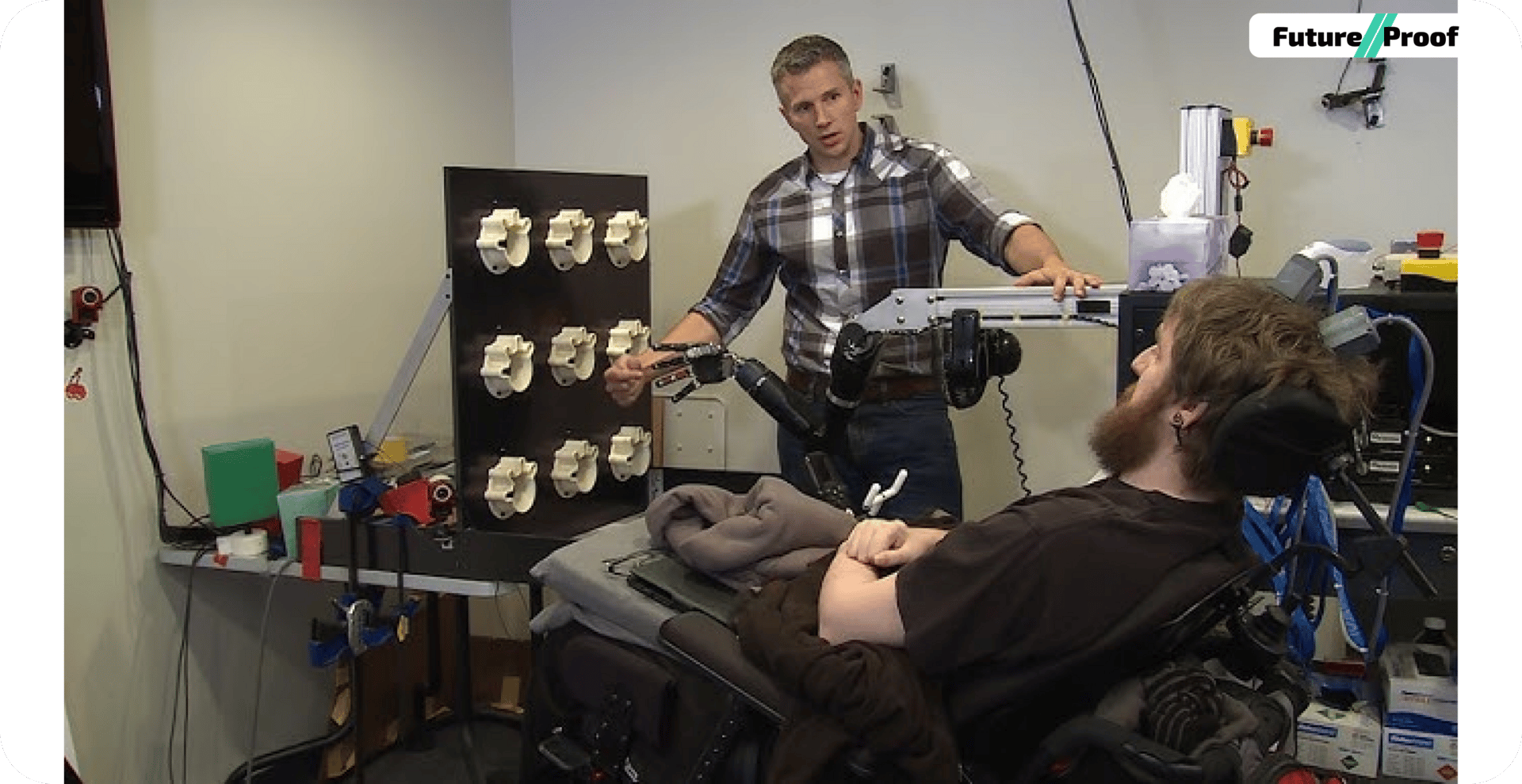- Future//Proof
- Posts
- 😱 Employee sold AI secrets of Grok AI to OpenAI [Elon files lawsuit]
😱 Employee sold AI secrets of Grok AI to OpenAI [Elon files lawsuit]
Plus, 4 more crazy AI updates in this week’s edition – don’t miss out 👇
Welcome to the Future//Proof 🚀
👋 Hello , the AI Enthusiast.
In this week’s edition, we brought AI updates backed by high-quality research and data to give you deeper insights. You'll find the Top AI Breakthrough of the Week, a featured AI tool with a mini-tutorial, learning resources to help you master these tools, the top 3 AI news stories, and more.
Our goal is to help you improve your knowledge and stay ahead in the rapidly evolving AI landscape. You can submit your questions, queries, thoughts, opinions or anything regarding AI as a reply to this email and we'll feature and address them in our next newsletter.
🚀 Now Let’s dive in and explore the new AI Insights together!
⌛ Read Time: 6m:03s
Keep This Stock Ticker on Your Watchlist
They’re a private company, but Pacaso just reserved the Nasdaq ticker “$PCSO.”
No surprise the same firms that backed Uber, eBay, and Venmo already invested in Pacaso. What is unique is Pacaso is giving the same opportunity to everyday investors. And 10,000+ people have already joined them.
Created a former Zillow exec who sold his first venture for $120M, Pacaso brings co-ownership to the $1.3T vacation home industry.
They’ve generated $1B+ worth of luxury home transactions across 2,000+ owners. That’s good for more than $110M in gross profit since inception, including 41% YoY growth last year alone.
And you can join them today for just $2.90/share. But don’t wait too long. Invest in Pacaso before the opportunity ends September 18.
Paid advertisement for Pacaso’s Regulation A offering. Read the offering circular at invest.pacaso.com. Reserving a ticker symbol is not a guarantee that the company will go public. Listing on the NASDAQ is subject to approvals.

An in-depth look at a major AI development, its industry impact, how it could affect your career, and a bold future prediction.

AI helps paralyzed patients control robots
UCLA’s engineers debuted a wearable, noninvasive brain-computer interface that uses AI as a real-time co-pilot to decode EEG-recorded movement intent and translate it into precise control of a cursor or robotic arm. Their system paired custom decoders with computer-vision AI to guide tasks—from hitting eight screen targets to moving four blocks—much faster than without AI. A paralyzed participant, who couldn’t complete the robotic arm task unaided, finished it in roughly 6½ minutes with AI support. This marks a leap in practical, low-risk BCI performance, trading invasive surgery for wearable ease while delivering speed gains and restoring high-precision control for people with movement disorders.
Potential Impact
This changes the game for rehabilitation, assistive robotics, and hands-free control. Think paralysis, ALS, or severe mobility impairments gaining practical independence in daily tasks. Surgeons, industrial operators, or exhausted professionals could execute commands without touch. Creative industries—for instance, digital art or design—could leverage thought-driven interfaces. This system isn’t merely another BCI—it’s a productivity inflection, cutting out surgical risk and unlocking fluent intent translation via a wearable device.
Implications for People/Careers
Neuro-engineers, EEG specialists, and AI-integration experts gain new leverage. Clinicians and rehab techs must adapt to tools where AI decodes not just signals but intent. Robot-arm programmers, rehabilitation therapists, and assist-tech startups enter a high-velocity innovation curve. Entry-level technicians might shift from hardware tweaking to AI signal training. Mid-career specialists must upskill in computer-vision-augmented neuroscience. Senior researchers can lead patent-rich, interdisciplinary projects. Meanwhile, professions relying on manual control face real disruption. This won’t replace jobs—it evolves them, ruthlessly favoring cross-domain fluency over outdated silos.
Our Future//Take
This is our pivot point: BCI moves from lab oddity to wearable reality. Expect a wave of startups, clinical trials, and ed-tech courses in AI-augmented neurointerfaces. If you’re in health tech, start wiring intent-aware features in your next-gen products. Universities should spin up multidisciplinary programs blending EEG, computer vision, and robotics. National innovation policy must shift funding to scalable, noninvasive interfaces. You’re witnessing the birth of mainstream cognitive control systems. Act now or watch competitors reclaim mobility’s future. Master AI for FREE 🎁

Quick summaries of this week's top AI news, their relevance to your career, and our expert opinions.
Elon Musk’s xAI has filed a lawsuit against former engineer Xuechen Li, accusing him of stealing sensitive information about its Grok AI chatbot. The lawsuit alleges that Li downloaded confidential data in July 2025, shortly after accepting a position at OpenAI and cashing out $7 million in xAI stock. Li reportedly admitted to taking company files during a meeting on August 14, 2025, and attempted to conceal his actions. Investigators later uncovered additional undisclosed material on his devices. xAI argues that the stolen information could give OpenAI an unfair advantage in enhancing ChatGPT with features surpassing those of Grok. The company is seeking unspecified damages and a court order preventing Li from joining OpenAI. This legal clash highlights the intensifying competition for top AI talent and the personal rivalry between Musk and OpenAI, which he co-founded in 2015.
Why It Matters to You
This lawsuit signals a critical juncture in the AI industry, where proprietary knowledge and talent are becoming the most valuable assets. For professionals and companies in the AI space, this case underscores the importance of safeguarding intellectual property and the potential legal repercussions of data misappropriation. It also highlights the competitive dynamics between AI firms, especially as they vie for leadership in developing advanced models like Grok and ChatGPT.
Our Take
The legal action taken by xAI against Xuechen Li is more than a dispute over stolen data; it’s a strategic move in the high-stakes race for AI dominance. This incident may prompt other AI companies to reevaluate their internal security protocols and talent retention strategies. For professionals in the field, this serves as a reminder of the ethical and legal responsibilities associated with handling sensitive information. As the AI industry continues to evolve, staying informed about such developments is crucial for navigating the competitive landscape.
Meta's Superintelligence Labs (MSL), launched in June 2025 with a focus on "personal superintelligence," has experienced significant turnover, with at least eight employees departing within two months. Departures include long-term contributors like Bert Maher, co-creator of PyTorch, and Tony Liu, a leader in GPU systems. The exits are attributed to organizational instability and disparities in compensation, as new hires received offers up to 50 times higher than existing staff. In response, Meta has frozen AI hiring to restructure its operations. This situation reflects broader industry challenges in balancing rapid expansion with internal cohesion.
Why It Matters to You
The rapid turnover at Meta's Superintelligence Labs underscores the complexities of scaling AI teams. For professionals in the AI sector, this highlights the importance of aligning compensation strategies with team morale and long-term stability. Organizations should consider the potential risks of aggressive hiring practices and ensure that internal teams are adequately supported to maintain productivity and innovation.
Our Take
Meta's experience serves as a cautionary tale for other tech companies aiming to build elite AI teams. While attracting top talent is crucial, it's equally important to foster an inclusive and supportive environment for existing staff. Companies should prioritize transparent communication and equitable treatment to mitigate the risk of internal unrest. As the AI industry continues to evolve, maintaining a balanced approach to talent acquisition and retention will be key to sustaining growth and innovation. 👉 Do Not Delay Anymore - Master AI Before Its Too Late.
A real-world trial involving over 1.5 million patients across 200 GP surgeries has demonstrated that an AI-enabled stethoscope can detect three heart conditions—heart failure, atrial fibrillation, and heart valve disease—in just 15 seconds. The device, approximately the size of a playing card, records an ECG and captures heart sounds, transmitting this data to the cloud for AI analysis. Patients examined with the AI stethoscope were 2.33 times more likely to be diagnosed with heart failure, 3.45 times more likely to be diagnosed with atrial fibrillation, and 1.92 times more likely to be diagnosed with heart valve disease within a year. Despite these promising results, 70% of GP surgeries ceased using the technology after 12 months, citing integration challenges into existing workflows.
Why It Matters to You
This development signifies a pivotal shift in cardiovascular diagnostics, offering a rapid, non-invasive method for early detection of critical heart conditions. For healthcare professionals, this technology could enhance diagnostic accuracy and patient outcomes. For patients, it represents the potential for earlier intervention and treatment, possibly reducing the incidence of severe complications. The integration of AI into routine clinical practice could streamline workflows and improve efficiency, though successful adoption will require overcoming implementation barriers.
Our Take
The AI stethoscope's ability to swiftly identify multiple heart conditions underscores the transformative potential of AI in healthcare. However, the observed decline in usage among GP surgeries highlights the need for thoughtful integration strategies. To capitalize on this innovation, healthcare systems must invest in training, infrastructure, and support to ensure seamless adoption. The future of healthcare lies in the effective collaboration between AI technologies and clinical expertise, aiming to deliver timely and accurate care to patients. ⚡AI Mastery for FREE (Sign up Now).

Discover a comprehensive guide to an AI tool, exploring its features, practical use cases, and learning resources to help you master it.

Lindy Build is an AI-powered platform that creates full-stack web applications from natural language descriptions. It handles front-end, back-end, and database integration, with built-in testing for bug detection. Users can also integrate AI agents to automate business functions, cutting down development time and costs.
⭐ Top Features
Text-to-Audio/Video Editing: Generate polished podcast and video content from simple prompts or scripts.
AI-Enhanced Editing: Automatically cuts, arranges, and fine-tunes audio and video files to produce high-quality outputs.
Real-Time Transcription: Transcribes spoken content into text, making it easy to repurpose or search through content.
Seamless Integration: Works with common content creation platforms to integrate smoothly into existing workflows.
Customizable Templates: Offers pre-built templates to speed up content creation, making the process more efficient.
Voice Enhancement: Improves audio quality with AI-driven voice clarity and noise reduction.
User-Focused Interface: Designed for both experienced creators and beginners, with easy-to-use controls.
Future-Proof: Continuously evolving to incorporate the latest advancements in AI to stay ahead of content production trends.
Content Personalization: Tailors outputs based on audience preferences, allowing creators to maximize engagement.

A curated list of noteworthy AI tools and their key details to help you stay ahead in your field.

Merra is an AI-powered recruitment platform that helps startups hire top software engineers from Southeast Asia. It automates candidate sourcing, conducts AI-driven interviews, and provides detailed candidate scores and transcripts to streamline the hiring process.

Captioner is an AI tool for video transcription and subtitle generation. It supports over 98 languages, real-time editing, and SRT file export, making it ideal for content creators and marketers who want to enhance video accessibility and engagement.

Remio is an AI-powered personal knowledge management tool that organizes web content, files, and notes into a searchable knowledge base. It helps professionals and students efficiently manage and retrieve large volumes of information.

ThinkFill is an AI autofill assistant that automates form filling, comments, and responses by learning your writing style. It works across websites and document editors to save time and boost productivity for professionals, content creators, and students.

A quick poll to help you recollect and engage with key points from the newsletter.
Meta’s recent issues with its Superintelligence Labs underscore a broader challenge in which area? |

Share your feedback on today's edition to help us improve and better meet your needs.
How was Today’s Edition? |
Share our Newsletter ⏩
Enjoying our insights on the latest AI breakthroughs? Don’t keep it to yourself! Share this newsletter with friends and colleagues who are passionate about technology and AI innovation.
If you haven’t subscribed yet, make sure to subscribe here to stay updated with cutting-edge AI news, tools, and tutorials delivered straight to your inbox!
Ask Us Anything AI ❓
Got questions? We've got answers!
Submit your questions, queries, thoughts, opinions or anything regarding AI and we'll feature and address them in our next newsletter. Your curiosity drives our content!
👇 Reply to this email with your questions, and we'll answer them in our next edition!👇

